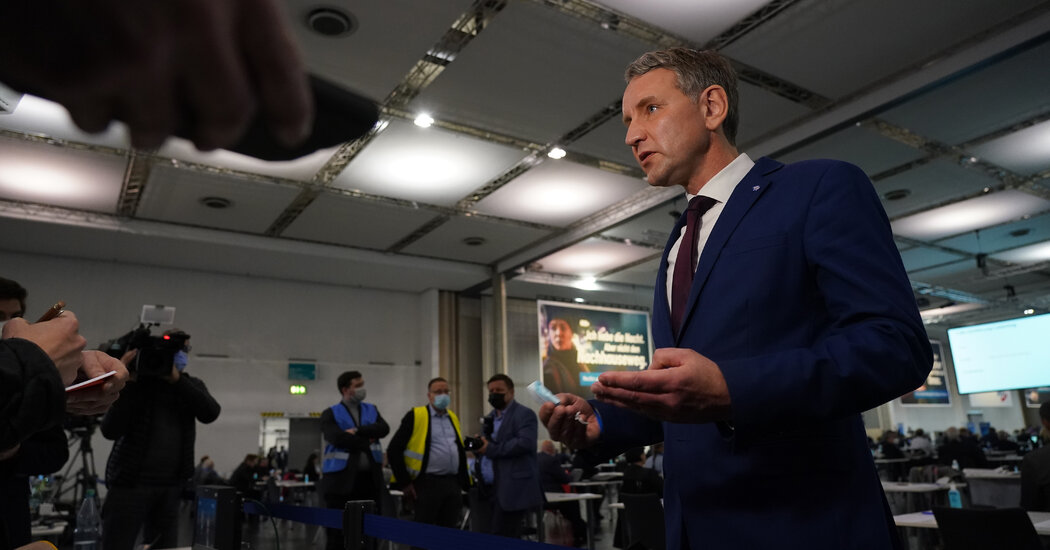Thirst and Hunger Grow in Besieged Gaza Amid Israeli Bombardment

Mohammed Aborjela, 27, used to document daily life in the Gaza Strip on his Instagram account before the war, videos about a crab dish prepared along the seaside or pigeon racing in the coastal enclave.
Now, he has turned to documenting daily life under Israeli bombardment. On Sunday, he posted a story about the daily struggle to find drinking water.
He records snippets as he walks, carrying a bright yellow jug to one of the few water stations still functioning in the southern city of Khan Younis. At the station, people — many of them children who struggle to carry the full jugs home — jostle for position in a chaotic line to fill up on well water.
“There’s no more water in the taps, so we have to go get water in this way,” Mr. Aborjela, a project coordinator with the development organization Youth Without Borders, told The New York Times. “The conditions for filling up water are not healthy. People are on top of one another and people are getting sick.”
Gaza, blockaded by Israel and Egypt for 16 years, has long had a precarious water supply. Residents relied on groundwater filtered at water stations, desalination plants, a pipeline from Israel and bottled imports.
Now, the taps have run dry, trucks are no longer refilling household water tanks, and the desalination plants have largely ground to a halt for lack of electricity and fuel. Israel imposed a siege on Gaza on Oct. 9 — cutting off water, food, electricity and fuel — in response to the attack on Israel two days earlier by Hamas, the armed Palestinian group that rules the strip.
Survival in Gaza now means not only escaping death from the thousands of Israeli airstrikes that have rained down over the past two weeks, but also finding enough to eat and drink. The United Nations has called the situation a humanitarian catastrophe and has warned that all of Gaza is in danger of running out of water as a result of the Israeli siege.
Some Gazans are skipping multiple meals just to ensure their children are able to eat. Others have resorted to drinking brackish water or mixing potable water with contaminated water.
The streets are filled with people carrying jugs or bottles to fill whenever they have the chance. The lucky ones have donkey-drawn carts: Few vehicles are on the streets these days as what little fuel is left in Gaza is mostly reserved for ambulances to ferry the dead and injured and to run hospital generators.
Israeli drones buzz in the sky overhead and airstrikes regularly pound the crowded and impoverished territory that is home to more than two million Palestinians. Even after the Israeli military ordered more than a million of them to evacuate the northern half of Gaza and head south ahead of an expected ground invasion, the south has not escaped deadly bombardments.
Every morning, Alee Dababish, 19, leaves the home where she and her family have sought shelter in southern Gaza in search of the day’s water and bread. Her family, including four young children, have been in Khan Younis for 11 days after fleeing their home in Gaza City in the north when airstrikes hit the buildings around them, she said.
“We come here even as we’re afraid they might strike the bakery, but we have no other choice. We have to come here to feed the children,” Ms. Dababish said on Tuesday while standing in a line with her sister. “We know at any moment they can strike the bakery or around the bakery.”
The head of the Hamas government’s media office, Salama Maarouf, said in a statement on Wednesday that Israeli airstrikes had destroyed a bakery at Al Maghazi refugee camp in the central Gaza Strip, hours after UNRWA, the U.N. agency that aids Palestinian refugees, supplied it with flour sacks to make bread for tens of thousands of displaced people.
Four aid convoys that reached Gaza from neighboring Egypt in recent days have brought in water and food.
Mr. Maarouf went on to accuse Israel of bombing 10 bakeries across the Gaza Strip as of Wednesday.
Asked about these allegations, the Israeli military said it “only and specifically strikes military targets. The allegations to the contrary are abhorrent and spread disinformation that put civilians at risk.”
Ms. Dababish said she sometimes waited in line for hours to buy bread and had seen fights break out. Sometimes she walks from bakery to bakery just to buy a loaf. Some don’t have gas to power their ovens while at others the line is too long.
And then there are the days when she can’t find any bread to buy.
At home she and the other adults often skip meals and go to bed hungry in order to ensure the children can eat, she said.
The water situation is just as dire.
“We drink salty water. Everyone is drinking salty water,” she said.
“Every day, we live this struggle,” she added. “The important thing is for this war to end and for us to return to our homes in Gaza City and see who has remained alive and who has been martyred and who has been injured.”
Last week, after days of acute water shortages in Gaza, Israel agreed to restore water to a pipeline that served a southern part of the territory. But that has done little to relieve the water crisis and the daily search.
The U.N. says the water coming in aid shipments is a fraction of the bottled water that Gaza needs on a daily basis.
Israel so far has barred the humanitarian aid convoys from bringing fuel, which is needed to power water facilities and desalination plants.
Yahya al-Qahwi, 30, said on Tuesday that he and his family have had to cut back on bathing and use water only for crucial necessities.
“At 6 a.m., we set out and go around to find water and fill up. We don’t have any water at home,” he said, standing next to a horse-drawn cart where he had piled on a large black water tank and two smaller yellow jugs.
Others at the same water station in Khan Younis said they were only able to bathe once a week now.
They cannot afford to use too much water on any given day because there is no assurance that they will be able to fill up the next morning. Sometimes by the time Mr. al-Qahwi gets to water stations around the town, their power will have cut and there’s no more water. So he moves on to the next spot.
“We go from one station to another,” he said. “Sometimes we’re not finding salty or drinkable water. We are exhausted just finding anything.”




